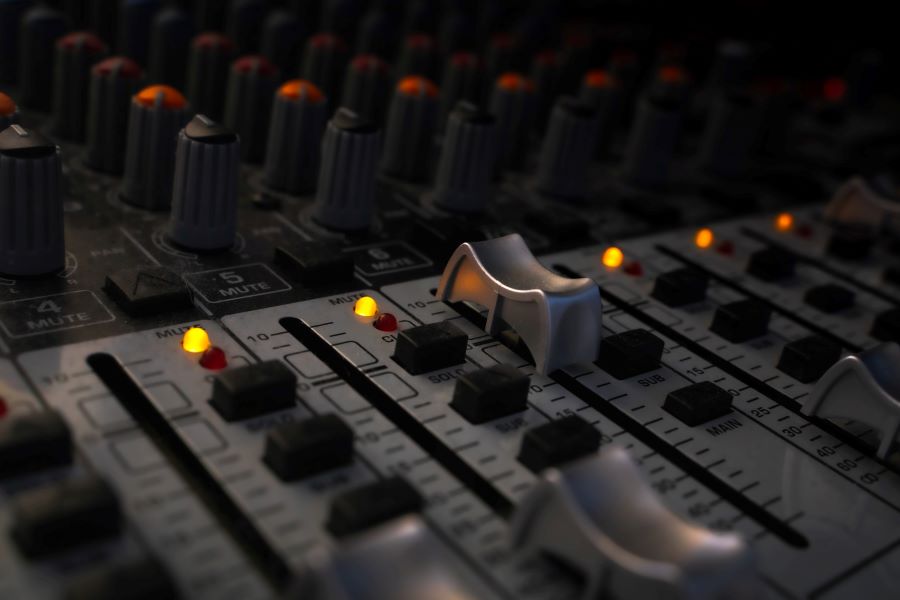Are you looking for the best podcast mixer? You’ve come to the right place! In this guide, we’ll share our top nine picks and help you decide which one is right for you. We’ve got you covered whether you’re just starting out or looking to upgrade your current setup.
So, what are you waiting for? Let’s get started!
What Is A Podcast Mixer?
A podcast mixer is a piece of audio equipment that allows a podcaster to mix multiple audio sources into a single track. This is useful for interviews, where you might want to have the interviewer’s voice on one track and the interviewee’s voice on another.
A podcast or audio mixer also allows you to adjust the volume levels of each track so that you can make sure everything sounds balanced. And finally, it also allows you to apply various sound effects (like EQ or compression) to each track to make them sound better.
Related: Audio Interface vs. Mixer
9 Best Podcast Mixers
1. Yamaha AG06 6-Channel Mixer/Interface
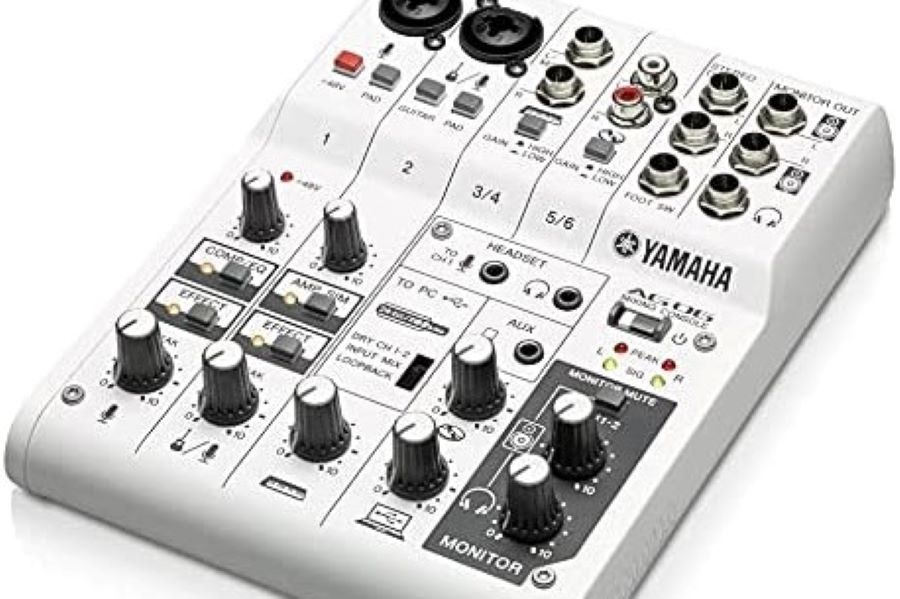
AG is a multi-purpose, high-resolution mixer and USB audio interface designed to elevate the creative, audio experience. Image Source.
The Yamaha AG06 is a versatile and powerful tool for any musician or audio engineer. With six channels, it’s perfect for live mixing or recording, and the high res (24-bit 192kHz) audio interface with 2-tracks makes it easy to capture your performances.
The LOOPBACK feature allows you to route audio anywhere, making it perfect for webcasting or live recording. And with 1-TOUCH EQ/COM, AMP SIM, and EFFECT processing, it’s easy to get the sound you want.
The iPad connectivity with AICCK (Apple iPad Camera Connection Kit) allows you to use your iPad as a control surface. And the included Cubase Al recording/midi-sequencing software makes capturing and editing your performances easy.
Key Features
- 6 channels
- 24-bit 192kHz 2-track audio interface
- LOOPBACK feature
- 1-TOUCH COMP/EQ, EFFECT, and AMP SIM processing
- iPad connectivity
- Cubase Al recording/midi-sequencing software included
What We Like
- Great sound quality
- Powerful and versatile
- Easy to use
- High-quality audio
- Lots of features
What We Don’t Like
- It may be too complicated for some users
- The included Cubase Al version is not the full version
Bottom Line: The Yamaha AG06 is a great choice for those who want a versatile and feature-rich digital mixer. It’s easy to use and produces great sound quality.
Related: Best Multi USB Microphone Mixer
2. Allen & Heath ZEDi-8
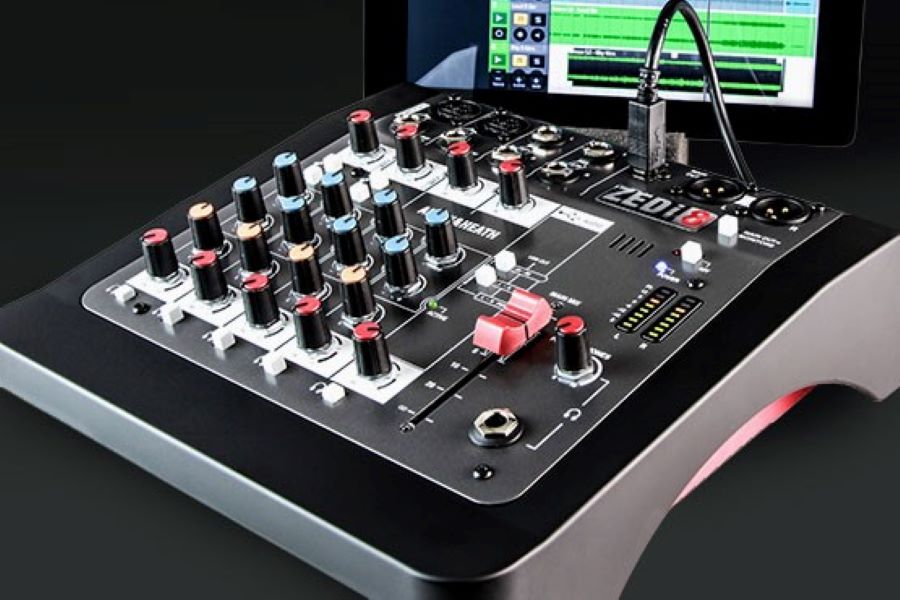
The ZEDi-8 provides all the tools you need to record your podcast to a professional standard. Image Source.
Trying to find a mixer that is both affordable and high-quality? Check out the Allen & Heath ZEDi-8! This mixer is packed with features that make it perfect for studio and stage use.
The GS-Pre XLR microphone preamps deliver amazing sound quality. The MusiQ EQ with 3-band ensures that your audio sculpting will always be musical, while the 100Hz high pass filter allows you to remove unwanted low frequencies.
With the 96kHz stereo USB interface, it’s easy to stream or record mix sessions or separate tracks. With 2 mic inputs, 2 line/instrument inputs, 2 headphone outputs, mix minus, and USB connection, the ZEDi-8 has everything you need to get great sound. So don’t wait any longer; order your Allen & Heath ZEDi-8 today!
Key Features
- Compact 8-channel mixer
- 3-band EQ on each channel
- 60mm main level fader
- Built-in stereo USB interface
What We Like
- Easy to use
- Great digital recorder
- Best for podcast recording and phone calls
- Compact and lightweight
- Affordable
What We Don’t Like
- No effects included
- EQ can be a bit too subtle for some users
Bottom Line: The Allen & Heath ZEDi-8 is a great compact mixer with plenty of features and great sound quality. It’s easy to use and affordable, making it a great choice for both beginners and experienced users.
3. BEHRINGER Q1202USB
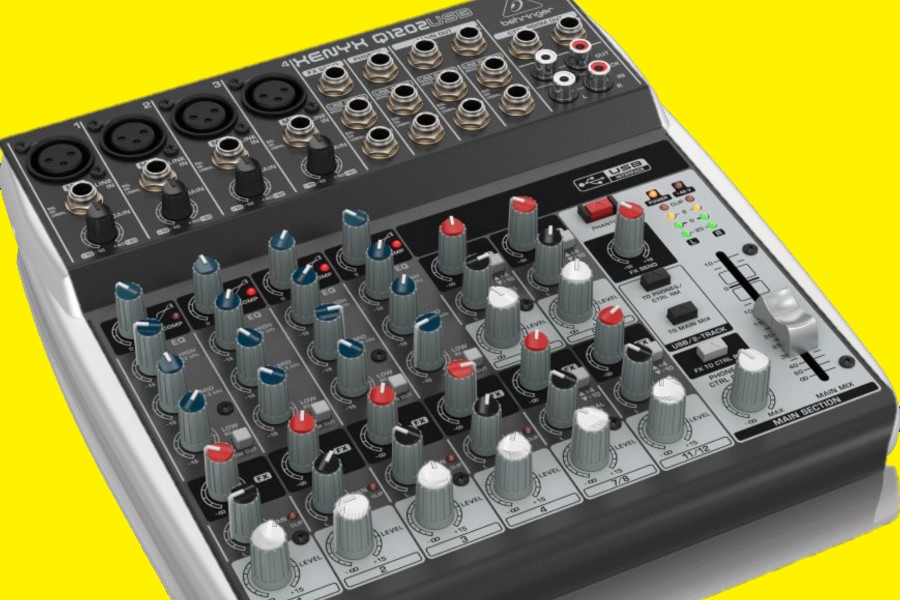
The compact Q1202USB mixer allows you to effortlessly achieve premium- quality sound. Image Source.
Are you looking for an analog mixer that can deliver premium sound quality? Look no further than the BEHRINGER Q1202USB. This mixer is equipped with four SOTA (state-of-the-art) XENYX Mic Preamps, which are on par with high-quality, independent preamps.
These preamps offer ultra-low noise and high headroom, making them ideal for capturing studio-grade sound. The Q1202USB also features studio-grade compressors with easy-to-use “one-knob” functionality. These compressors allow you to achieve professional vocal and instrumental sound quality.
The Q1202USB features Newer, “British”-style 3-band equalizers that emit a warm and inviting sound. With all of these great features, the BEHRINGER Q1202USB will meet all your sound mixing needs.
Related: Behringer UM2 vs UMC22: Our Audio Interface Comparison Guide
Key Features
- 4 SOTA (state-of-the-art) XENYX Mic Preamps
- Newer, “British”-style 3-band equalizers
- USB interface for easy connection to your computer
What We Like
- High-quality mic preamps
- Easy to connect to your computer
- Plenty of channels
What We Don’t Like
- It’s a bit pricey
Bottom Line: Overall, the Behringer Q1202USB is a great choice for podcasting. It has high-quality mic preamps, an easy connection to your computer, and plenty of channels. The only downside is the price. But if you’re looking for a top-of-the-line mixer for podcasting, the Q1202USB is a great option.
4. Behringer Xenyx 1204USB Mixer
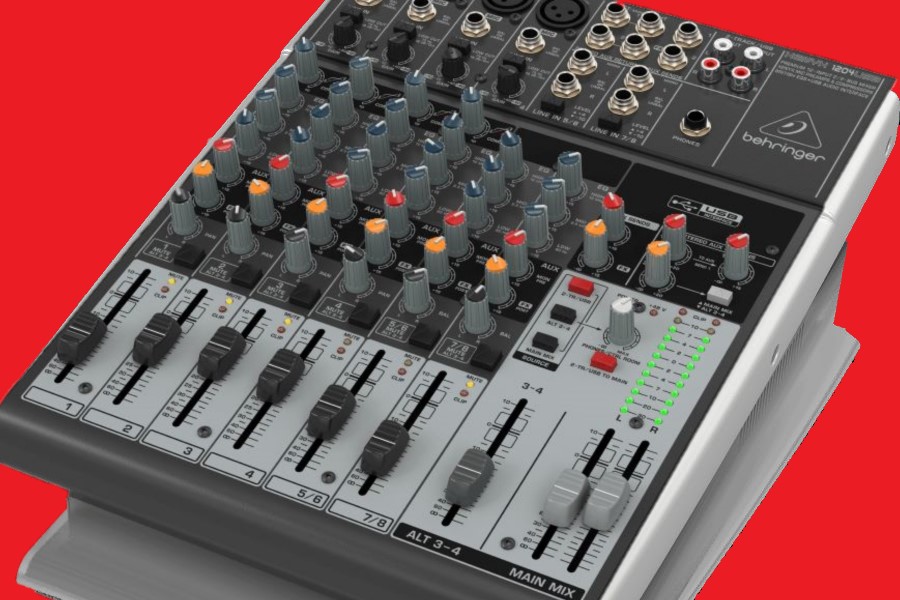
Along with the built-in USB/audio interface, the 1204USB comes with all the recording and editing software. Image Source.
Are you looking for a top-notch mixer to take your audio to the next level? Check out the Behringer Xenyx 1204USB Mixer. This top-of-the-line mixer features quiet, high-quality analog mixing capabilities and four SOTA XENYX mic preamps. Additionally, this product comes with 4 compressors that can be easily controlled with only one knob.
The stereo Audio Interface allows you to connect straight to the computer for audio recording, editing, and podcasting.
It also includes 150 effect plug-ins, a low-latency driver, and free software. So don’t wait any longer; order the Behringer Xenyx 1204USB Mixer today!
Key Features
- 4 SOTA (state-of-the-art), phantom-powered Mic Preamps
- Built-in stereo USB/Audio Interface.
- Free software
- Ultra-low latency driver
What We Like
- The sound quality is fantastic
- The build quality is very solid
- The USB/Audio Interface is extremely convenient
- The compressors are easy to use and sound great
- The included software is top-notch
What We Don’t Like
- Some users have reported issues.
Bottom Line: The Behringer Xenyx 1204USB Mixer is a high-quality, low-noise mixer that is perfect for podcasting. It comes with free audio recording, editing, and podcasting software. It has 4 SOTA (state-of-the-art) XENYX comparable to stand-alone boutique preamps.
5. YAMAHA MG10XU 10-Input Stereo Mixer
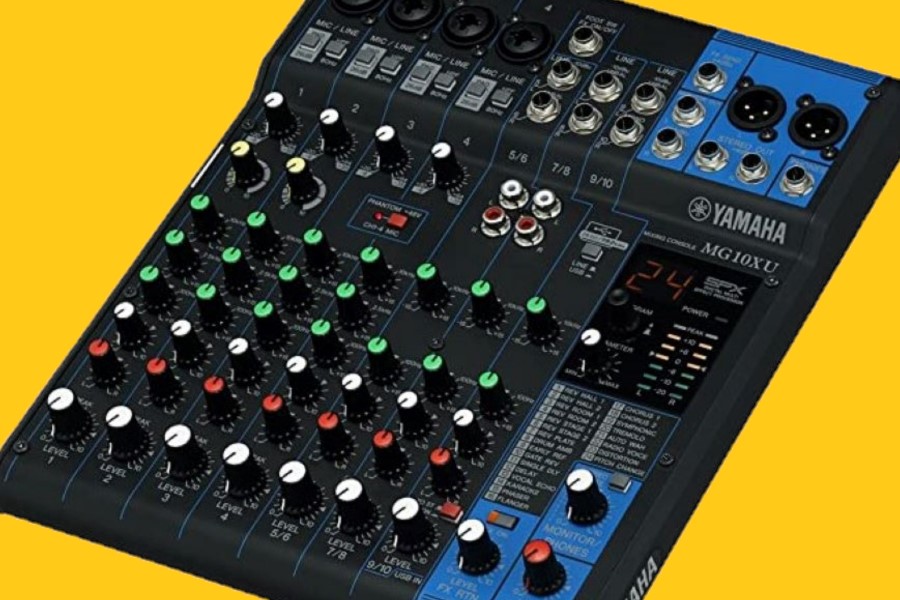
The MG Series mixers feature a rugged, impact resistant, powder coated metal chassis. Image Source.
The YAMAHA MG10XU 10-Input Stereo Mixer is a top-quality mixer that is perfect for those who need to mix various audio sources. With 10 channels, this mixer provides plenty of flexibility to get the perfect mix.
The 3-band EQ and high pass filters allow you to fine-tune the sound to perfection, while the 1-knob compressors make it easy to control the overall dynamics of the mix. The MG Series mixers also feature a rugged design built to last.
Whether you’re a professional DJ or just someone who loves music, the YAMAHA MG10XU 10-Input Stereo Mixer is the perfect choice for anyone who wants the best mixing experience.
Key Features
- 3-band EQ
- High pass filters
- Compressors
- XLR input
- Great for podcasting
What We Like
- EQ is just the right amount of control
- High-pass filters help eliminate unwanted noise
- Compressors allow you to get a tighter sound
- Very easy to use
What We Don’t Like
- Doesn’t have an XLR input
Bottom Line: Overall, the Yamaha MG10XU is a great mixer for podcasts. If you’re looking for a great mixer for podcasts, the Yamaha MG10XU is a great option. It has all the features you need and is very easy to use.
Related: Best Audio Interface With XLR Output
6. Mackie ProFXv2 (PROFX8V2)
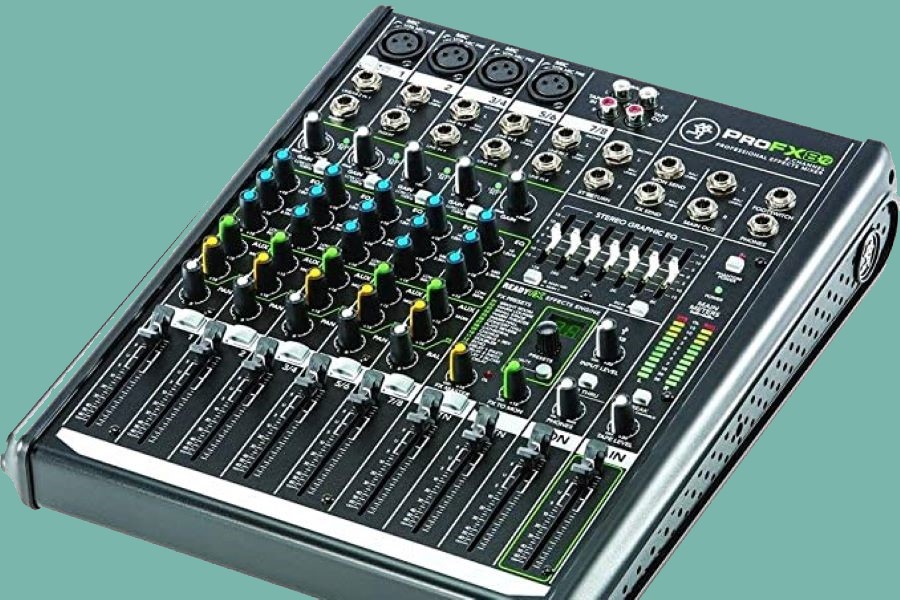
Mackie ProFXv2 mixers provide a comprehensive live sound solution with a wide range of models. Image Source.
Looking for a mixer that can provide stellar sound quality and give you the control you need to create the perfect mix? Look no further than the Mackie ProFXv2.
The ProFXv2 is an 8-channel mixer perfect for live sound, recording, and more. With Mackie Vita mic preamps and 7-band graphic EQ, you’ll be well on your way to making a great mix.
And its aux output lets you easily connect a monitor so you can keep an eye on your mix while performing. Whether you’re a beginner or a pro, the Mackie ProFXv2 is sure to give you the sound quality and control you need.
Related: Best Rodecaster Pro Alternatives for Podcasting
Key Features
- 8 channels
- Mackie Vita mic preamps
- 7-band graphic EQ
- Aux output
- Phantom power
What We Like
- Easy to use
- Great sound quality
- Flexible connectivity
What We Don’t Like
- It may be too expensive for some podcasters.
Bottom Line: The Mackie ProFXv2, a great podcast mixer, offers excellent sound quality, flexible connectivity, and easy-to-use controls. While it may be expensive for some podcasters, it’s worth the investment if you’re looking for a high-quality mixer.
Related: Best 8 Channel Audio Interface
7. Mackie (PROFX12V2)
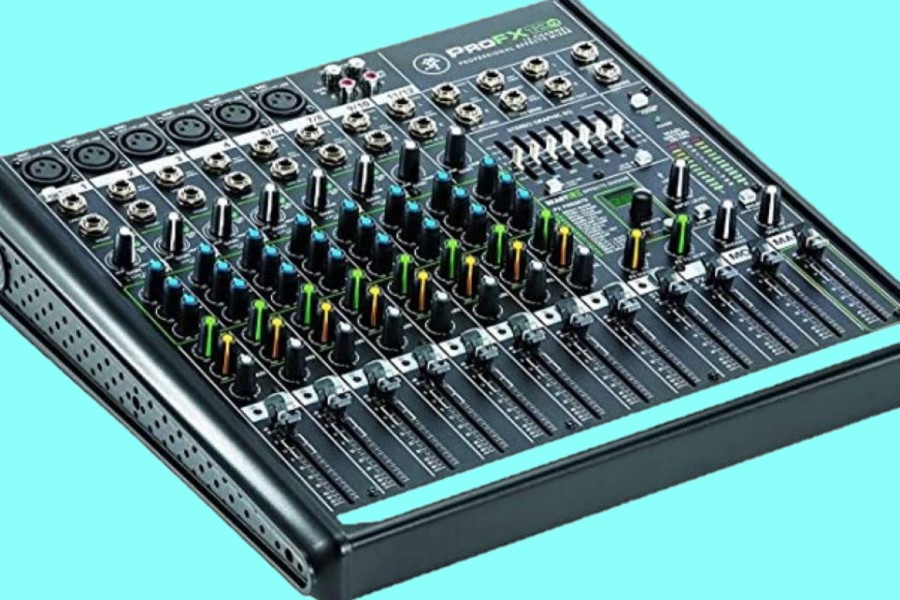
The ProFX12v2 is exactly what you need for mixing when the gig calls for minimal inputs. Image Source.
The Mackie PROFX12V2 is a 12-channel mixer with six low-noise preamps. The ReadyFX engine contains 16 effects, ranging from reverbs and delays to choruses.
The Aux output permits you to have monitor mixes, venue 70-volt systems, and beyond. On all channels, the three-band Equilzier has 80 Hz, 2.5 kHz, and 12 kHz on all bands, as well as a 100 Hz.
The Mackie PROFX12V2 is a great choice for those who need a versatile mixing solution for their podcasting needs. It offers a wide range of features and is very user-friendly. The mixer is well-built and offers great value for the price. Mackie’s three-year warranty also backs it.
Key Features
- 12 channels
- Mackie Vita mic preamps
- 7-band graphic EQ
- Aux output
- Phantom power
What We Like
- Great value for the price
- Very user friendly
- Well built
What We Don’t Like
- Some users have reported issues with the Aux output quality.
Bottom Line: Overall, if you are looking for a versatile audio mixer that is user-friendly and offers great value for the price, the Mackie PROFX12V2 is a great option.
8. Allen & Heath Mixer AH-ZED12FX
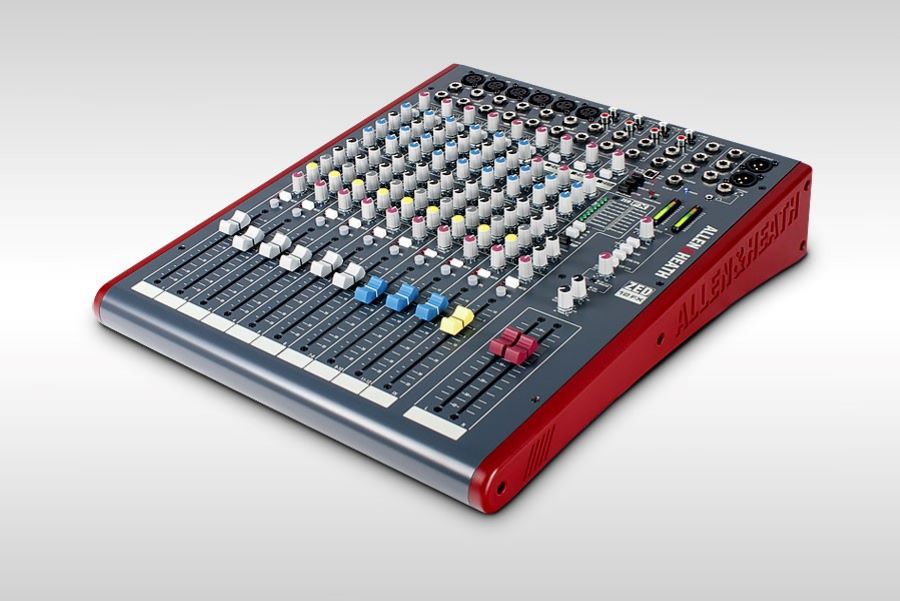
The 12FX squeezes in 4 auxiliary channels and swept semi-parametric EQ on top of the already impressive feature set. Image Source.
The Allen & Heath ZED12 is a great-sounding, compact mixer with an impressive feature set. It’s got six mic/line inputs, two of which can also be used for instruments, and three stereo line inputs.
The duoPre preamps sound very good, providing clear and detailed audio with plenty of headroom. The 100Hz high-pass filters are a nice touch, and the three-band EQs with swept mids are very musical and easy to use.
The built-in FX unit sounds great, with 16 different effects that can be tweaked to taste. The USB interface is class compliant and very easy to use, making it a great option for recording or playback from a computer or mobile device.
Overall, the Allen & Heath ZED12 is a great-sounding mixer with a lot to offer. Highly recommend it to anyone in the market for a compact mixer.
Key Features
- Six mic/line inputs
- Soundcraft ghost mic preamps
- Three stereo line inputs
- 100Hz high-pass filters on all mono inputs
- Three-band EQs with swept mids
- Built-in FX unit with 16 different types of effects
- USB interface for recording or playback
What We Like
- Great a sounding mixer with a lot of features
- Clear and detailed audio with plenty of headroom
- Easy to use EQs and FX
- The USB interface is class compliant and easy to use
What We Don’t Like
- None!
Bottom Line: The Allen & Heath ZED12 is a great-sounding, compact mixer with an impressive feature set. If you’re looking for a mixer with plenty of features and good sound quality, the ZED12 is a great option.
9. BEHRINGER Q502USB
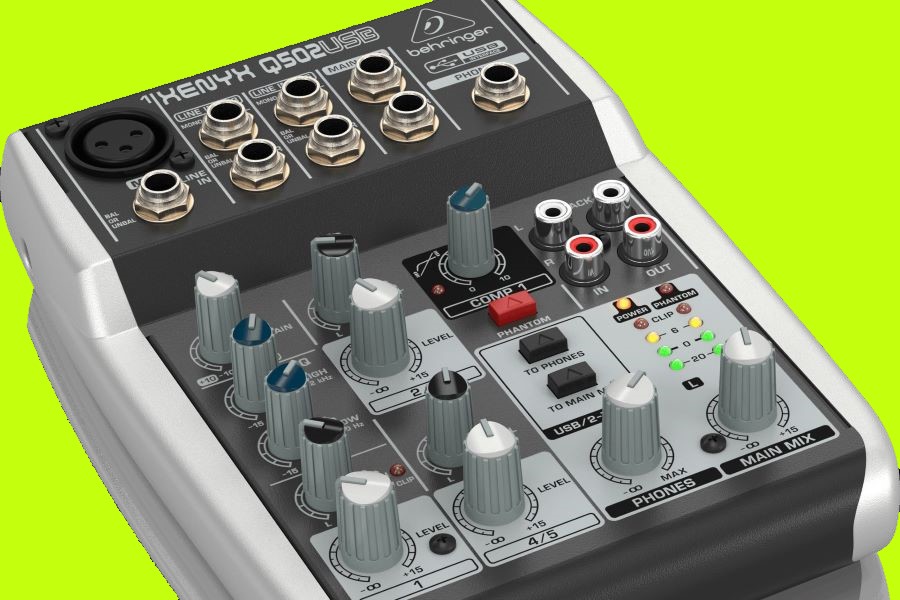
The ultra-compact XENYX Q502USB mixer has 5 Inputs (1 mic, 2 stereo). Image Source.
Looking for a great mixer that won’t break the bank? Check out the BEHRINGER Q502USB! This premium mixer is packed with features that make it perfect for live and studio applications.
The analog mixer has a very low noise level and can handle high sound levels. It is equipped with a phantom-powered preamp.
The SD1 provides high-quality compression with easy “one-knob” functionality and a control LED, allowing anyone to produce professional-sounding vocals or instrumentals. At the same time, the Neo-classic “British” 2-band EQ gives you a warm and musical sound.
The USB interface allows you to connect to the computer for easy recording and playback. The BEHRINGER Q502USB is a top-notch mixer that will take your sound to the next level!
Related: How to Use the Behringer Xenyx 1204USB Phantom Power
Key Features
- Ultra-low noise
- An analog mixer with a lot of headroom
- Phantom-powered Preamp
- USB interface for easy recording and playback
What We Like
- Excellent sound quality
- Easy to use
- Flexible controls
What We Don’t Like
- Some users have reported issues with the built-in USB interface.
Bottom Line: The BEHRINGER Q502USB is a top-of-the-line podcast mixer that offers the excellent sound quality, easy controls, and flexibility. If you’re looking for a top-quality podcast mixer, the Q502USB should be at the top of your list.
Related: Rodecaster Pro Companion App: Everything You Need to Know
How to Choose the Best Podcast Mixer?
Now that you know what to look for in a podcast mixer, it’s time to start shopping! Here are a few tips to help you choose the best mixer for your podcast:
Determine Your Budget
Like any other audio equipment, podcast mixers come in a wide range of prices. Before you start shopping, it’s crucial to determine how much you’re willing to spend. Otherwise, you could easily get caught up in all the bells and whistles and spend more than you intended. Once you have a budget, you can start narrowing down your options.
Related: Best Audio Interface Under 500 Dollars and Best Budget Mic Preamp
Consider Your Needs
As you shop for podcast mixers, keeping your needs in mind is important. What features are most important to you? How many channels do you need? What type of connectors do you need? By considering your needs upfront, you’ll be able to find a mixer that’s better equipped to meet your specific requirements.
Read Reviews
When considering any audio equipment, it’s always a good idea to read reviews before purchasing. Reviews can give you a better idea of what users think about a particular mixer. They can also help highlight potential problems you might not be aware of. Be sure to read reviews from multiple sources before making your final decision.
Compare Prices
Once you’ve determined which podcast mixer is right for you, it’s time to compare prices. Don’t assume that the most expensive option is also the best. Sometimes, you can find equally good quality at a fraction cost. By taking the time to compare prices, you’ll be more likely to find the best deal on a podcast mixer that meets your needs.
Related: Best Audio Interface For Shure SM7B and Best Preamp For SM7B
Ask For Recommendations
If you know someone who podcasts, then ask for their recommendations. They likely have first-hand experience with various mixers and can provide valuable insights into the best ones. Even if you don’t know anyone who podcasts, there are still plenty of resources online where you can find helpful recommendations. Simply doing a quick search on Google or social media will yield a wealth of results.
Related: Top Audio Interfaces For The RODE PodMic: Our Top Picks
Make Your Decision and Enjoy!
Once you’ve considered all the above factors, it’s time to decide and purchase the best podcast mixer for your needs! With so many great options on the market, there’s sure to be a perfect mixer for everyone. Enjoy exploring all the different features and capabilities that your new mixer has to offer!
Related: Best Thunderbolt Audio Interface For Logic Pro X
How to Use a Podcast Mixer?
Using a podcast mixer is relatively straightforward. However, if you’re new to the world of podcasting, you should know a few things before getting started. Here’s a quick guide on how to use a podcast mixer:
- Step #1 Connect your microphones: The first step is to connect your microphones to the podcast mixer. If you’re using XLR microphones, you’ll need to use XLR cables. If you’re using USB microphones, you can connect them directly to the mixer via USB.
- Step #2 Connect your headphones: Next, you’ll need to connect your headphones to the podcast mixer. This is so you can hear what you’re recording.
- Step #3 Turn on the mixer: Once everything is connected, you can now turn on the mixer.
- Step #4 Adjust the levels: Now, it’s time to adjust them. You’ll want to ensure the levels are not too high or too low. If they’re too high, it will cause clipping and distortion. If they’re too low, you won’t be able to hear anything.
- Step #5 Start recording: Once you’ve adjusted the levels, you can start recording. To do this, press the “record” button on the mixer.
- Step #6 Stop recording: When you’re finished recording, press the “stop” button on the mixer.
This is just a quick guide on how to use a podcast mixer. For more detailed instructions, please refer to the manual with your mixer.
Related: How to Connect a Blue Yeti Into a Mixer and How to Connect a Sound Mixer to a Mac (and Garageband)
Benefits Of Using A Podcast Mixer
Many benefits come with using a podcast mixer. Here are just a few of the most notable ones:
Improved Sound Quality
One of the biggest benefits of using a podcast mixer is that it can help improve the overall audio quality of your show. By having separate channels for each audio source, you can avoid any potential sound issues that might occur if you mix everything in one track.
Related: Focusrite Clarett vs Scarlett and Scarlett 2i2 vs Solo
Greater Control Over Your Audio
Another benefit of using a podcast mixer is that it gives you greater control over your audio. With separate channels for each audio source, you can individually adjust each track’s levels, EQ, and effects. This allows you to create a more polished and professional-sounding final product.
More Options For Connectivity
Podcast mixers also offer more options than a standard audio interface. Most mixers will have a variety of input and output connectors, which gives you greater flexibility when connecting different types of audio equipment.
Simplified Recording Process
Using a podcast mixer can simplify the recording process by allowing you to record multiple tracks simultaneously. This can save you a lot of time in the editing process, as you won’t have to record each track separately.
Increased Portability
Another great benefit of using a podcast mixer is that they are typically very portable, which makes them ideal for traveling podcasters. Most mixers are small and lightweight, which makes them easy to transport from one location to another.
Affordable
Podcast mixers can also be very affordable, which makes them a great option for those on a tight budget. There are many great options available at various price points, so you should be able to find one that fits your needs and budget.
As you can see, many benefits come with using a podcast mixer. If you’re serious about creating a high-quality show, investing in a good mixer is worth the money.
Related: Best Audio Interface Under 200 Dollars and Best Audio Interface Under 100 Dollars
Do You Need A Podcast Mixer?
Now that you know some of the benefits of using a podcast mixer, you might wonder if you need one. The answer to this question depends on a few different factors.
- The type of show you’re creating: If you’re creating a simple show that doesn’t require fancy mixing or effects, you probably don’t need a mixer. However, a mixer will come in handy if you’re planning on doing more complex audio editing.
- The number of people on your show: Another factor to consider is the number of people on your show. You definitely don’t need a mixer if you’re doing a solo show. However, if you have multiple people on your show, then a mixer can be very helpful in keeping everything organized.
- Your budget: Of course, one of the most important factors to consider is your budget. Mixers can range in price from very affordable to quite expensive. You’ll need to decide how much you’re willing to spend on a mixer before making your final decision.
As you can see, there are a few different factors to consider when deciding if you need a podcast mixer. If you’re unsure if you need one, it’s always best to avoid caution and get one.
Related: Do You Need A Mixer For A Podcast?
Conclusion
Podcast mixers come in all shapes and sizes with a variety of features. Knowing which mixer is the right one for your needs can be hard. That’s why we’ve put together this comprehensive guide to the top 9 best audio mixers on the market today.
By understanding what to look for in a mixer and comparing different models, you can find the perfect one for your home studio or professional recording setup. For further reading, check out our post on the Podcast Starter Kit.
Thanks for reading!
Related: Why Isn’t My Audio Interface Working? and Can You Use Two Audio Interfaces At Once?
